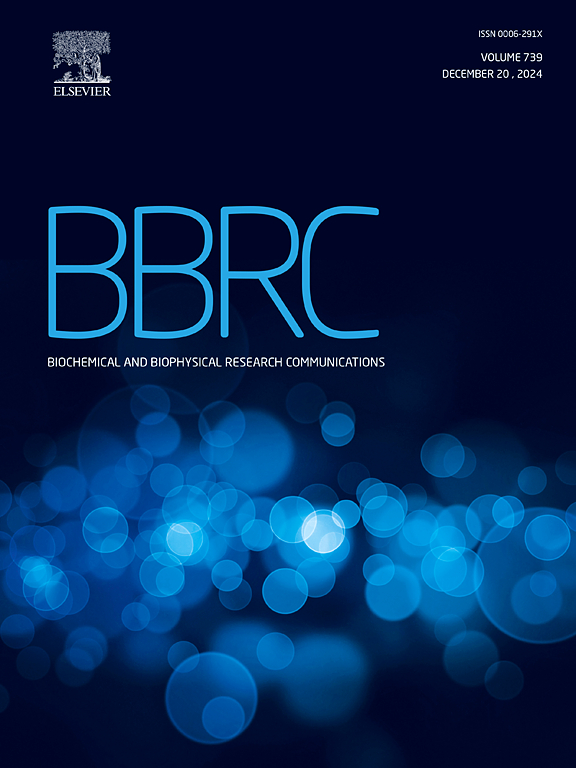Carbidopa ameliorates high-fat diet-induced insulin resistance by suppressing gut-derived tryptamine/phenethylamine and systemic 5-HT levels
IF 2.2
3区 生物学
Q3 BIOCHEMISTRY & MOLECULAR BIOLOGY
Biochemical and biophysical research communications
Pub Date : 2025-06-18
DOI:10.1016/j.bbrc.2025.152234
引用次数: 0
Abstract
Obesity and type 2 diabetes mellitus (T2DM) are major global health burdens, with insulin resistance (IR) as a key pathological driver. This study explores carbidopa, a selective aromatic l-amino acid decarboxylase inhibitor, as a modulator of gut-derived metabolites to alleviate high-fat diet (HFD)-induced IR. We observed that HFD markedly increased fecal tryptamine and phenethylamine levels, which positively correlated with elevated serum 5-hydroxytryptamine (5-HT). Carbidopa treatment suppressed gut production of these metabolites, reducing circulating 5-HT and improving insulin sensitivity in HFD-fed mice. Notably, carbidopa lowered fasting blood glucose, enhanced glucose tolerance, and promoted hepatic Akt phosphorylation. Our results demonstrate that carbidopa attenuates HFD-induced IR by disrupting gut microbiota-dependent synthesis of tryptamine and phenethylamine, thereby reducing systemic 5-HT. These findings identify the gut microbiota-tryptamine/phenethylamine-5-HT axis as a pivotal pathway in IR pathogenesis and position carbidopa as a promising therapeutic candidate for metabolic disorders. Further clinical investigations are needed to validate its translational potential in T2DM management.
卡比多巴通过抑制肠道源性色胺/苯乙胺和全身5-羟色胺水平改善高脂肪饮食诱导的胰岛素抵抗
肥胖和2型糖尿病(T2DM)是全球主要的健康负担,胰岛素抵抗(IR)是一个关键的病理驱动因素。本研究探讨了选择性芳香l-氨基酸脱羧酶抑制剂卡比多巴(carbidopa)作为肠道代谢物的调节剂,以减轻高脂肪饮食(HFD)诱导的IR。我们观察到,HFD显著增加了粪便中色胺和苯乙胺的水平,这与血清中5-羟色胺(5-HT)的升高呈正相关。卡比多巴抑制了这些代谢物的产生,减少了hfd喂养小鼠的循环5-羟色胺并改善了胰岛素敏感性。值得注意的是,卡比多巴降低空腹血糖,提高葡萄糖耐量,促进肝脏Akt磷酸化。我们的研究结果表明,卡比多巴通过破坏肠道微生物依赖的色胺和苯乙胺合成,从而减少全身5-羟色胺,从而减弱hfd诱导的IR。这些发现确定肠道微生物群-色胺/苯乙胺-5- ht轴是IR发病机制的关键途径,并将卡比多巴定位为代谢紊乱的有希望的治疗候选者。需要进一步的临床研究来验证其在T2DM治疗中的转化潜力。
本文章由计算机程序翻译,如有差异,请以英文原文为准。
求助全文
约1分钟内获得全文
求助全文
来源期刊
CiteScore
6.10
自引率
0.00%
发文量
1400
审稿时长
14 days
期刊介绍:
Biochemical and Biophysical Research Communications is the premier international journal devoted to the very rapid dissemination of timely and significant experimental results in diverse fields of biological research. The development of the "Breakthroughs and Views" section brings the minireview format to the journal, and issues often contain collections of special interest manuscripts. BBRC is published weekly (52 issues/year).Research Areas now include: Biochemistry; biophysics; cell biology; developmental biology; immunology
; molecular biology; neurobiology; plant biology and proteomics

 求助内容:
求助内容: 应助结果提醒方式:
应助结果提醒方式:


